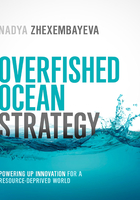
The Ocean of Ideas
A self-made billionaire who starts the Spanx lingerie company from a folding table… a 17-year-old who sells his app to Yahoo for $30 million… organic baby food started at a UK kitchen sold to an American giant…. We have all heard those stories—and (well, I have to speak for myself here) dreamed of being part of them. Could it be that the ocean of business ideas is also running dry?
According to PWC, 2013 started with a 12 percent decline in dollars spent in venture capital investment in the United States and a 15 percent decline in the number of deals. Such a decline is projected or already manifested in a number of US states (such as Ohio) and European countries (France comes to mind first) and runs across many industries. What is the issue?
Such a decline is projected or already manifested in a number of US states (such as Ohio) and European countries (France comes to mind first) and runs across many industries. What is the issue?
Sandi Cesko, a Slovenian entrepreneur who grew his company from $70 to $700 million in sales amid global crisis to become an entrepreneurial poster child for a Harvard Business Review story,
put it this way: “We are going through a major transition. In the past, we sold products. Today, we are selling services. But the global overcapacity, coupled with resource crunch, means something new. We simply cannot possibly sell more and more stuff. Tomorrow, our capacity to sell will depend on our ability to stay relevant.” We will have to sell meaning.
Sandi’s insights echo the work of business-trend watcher Daniel H. Pink. In his best-selling book A Whole New Mind, Dan speaks ofthe same patterns—or ages—that the global economy has been going through:
Think of the last 150 years as a three-act drama. In Act I, the Industrial Age, massive factories and efficient assembly lines powered the economy. The lead character in this act was the mass production worker, whose cardinal traits were physical strength and personal fortitude. In Act II, the Information Age, the United States and other nations began to evolve. Mass production faded into the background, while information and knowledge fueled the economies of the developing world. The central figure in this act was the knowledge worker. Now the curtain is rising on Act III. Call this act the Conceptual Age. The main characters now are the creator and the empathizer.
If our ability to compete in the future depends on the ability to create new meaning, how are we to foster this kind of innovation?